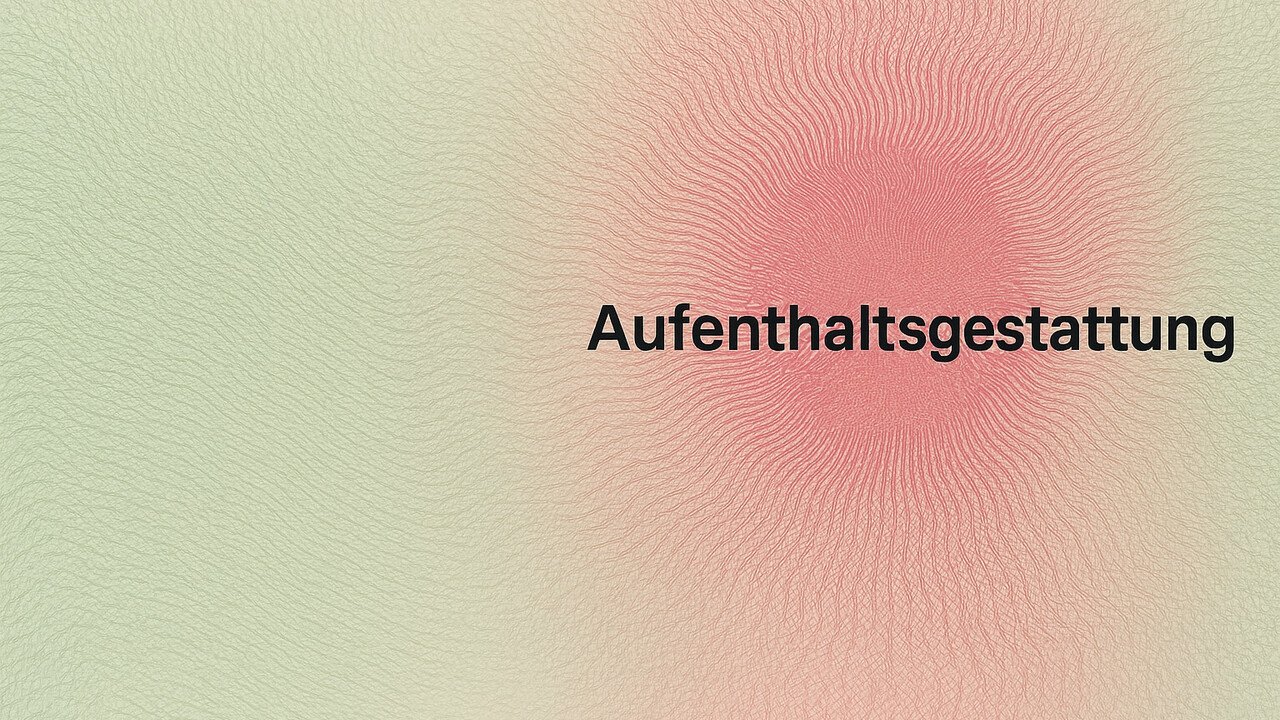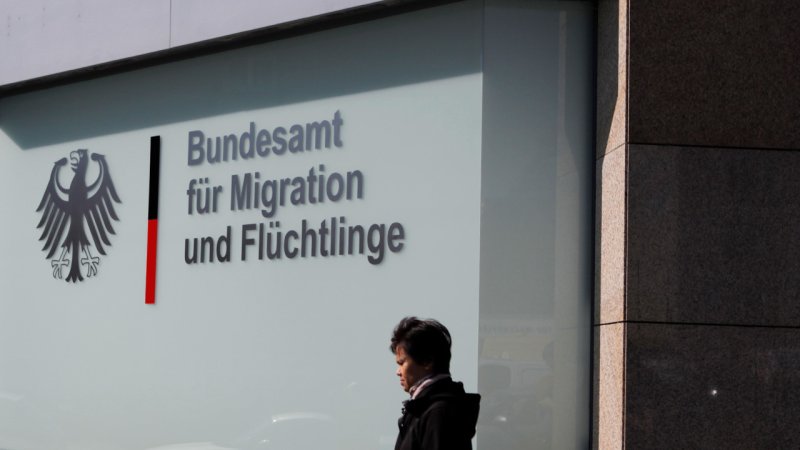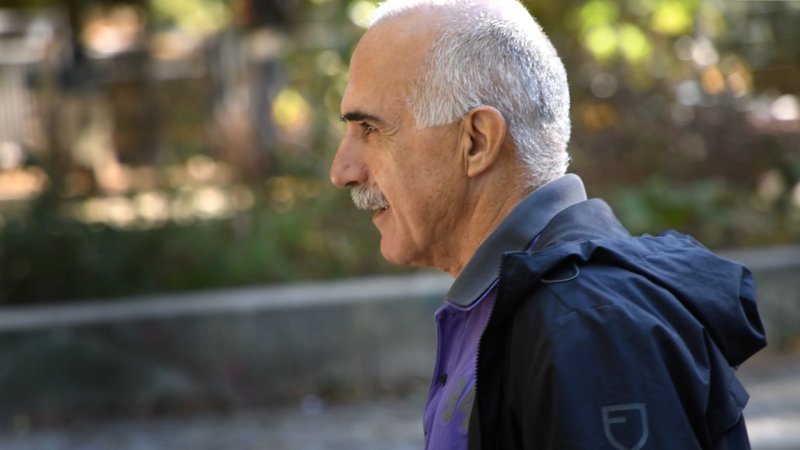Temporary Stay Permit ("Aufenthaltsgestattung")

What do I need to consider?
As soon as you have registered as an asylum seeker, you will be issued a proof of arrival or "Ankunftsnachweis". Then, after officially submitting your asylum application, you will be handed a temporary stay permit or "Aufenthaltsgestattung". The temporary stay permit is valid until the end of your asylum procedure. There are several regulations that individuals with an "Ankunftsnachweis" or "Aufenthaltsgestattung" must follow, including various limitations and restrictions. Here you can find out what rights and obligations you have during your asylum procedure.
Asylum Seeker Benefits
Asylum seekers can receive financial support from the state. This support is called asylum seeker benefits. You will receive these benefits for as long as your asylum procedure is ongoing. In some cases, you may receive them for longer.
Part of asylum seeker benefits is called basic benefits or “Grundleistungen”. These include benefits such as food and drink, accommodation and heating, clothing and shoes, hygiene items and household goods. In addition, so-called ‘pocket money’ is also part of the basic benefits, which you can use to buy, for instance, a SIM card, a bus ticket or other small items. Depending on where you live, these basic benefits are provided either directly in the form of benefits in kind, as a sum of money or (now common) via a payment card.
How much basic benefits you are entitled to depends, among other things, on your age and whether you are married and/or have children. You will receive a notice from the Social Welfare Office stating how much you will receive. If you do not receive this notice, ask your case worker at the Social Welfare Office about it. In addition, a counselling centre can tell you whether this notice is correct. You can find a counselling centre nearby on the websites of BAMF NAVI, MBE and JMD.
Important: Asylum seekers who are entitled to asylum seeker benefits can receive so-called analogous benefits (“Analogleistungen”) after 36 months of residence in Germany. These are as high as social welfare benefits. This means that you can receive higher benefits.
Please note: According to the law, people whose asylum application has been rejected as a so-called ‘Dublin case’ and whose deportation to another EU country has been ordered are not entitled to benefits. This is legally controversial. Social courts in Germany have already stopped the cancellation of benefits for people who have filed an urgent application. It is advisable to seek legal advice. You can find more information on the topic of ‘Dublin cases’ under ‘Dublin procedure" .
In the initial reception centres, you will usually receive benefits such as food, drink, accommodation, heating, clothing, shoes, hygiene items and household goods directly on site.
If you live outside an initial reception centre, for example in shared accommodation or in a flat, these benefits can be provided either in kind, as a cash payment, as vouchers or via a payment card. The competent authority decides for each person – depending, among other things, on their living situation – in which form they will receive these benefits. This may vary depending on the federal state and region. If you live in a flat, the authorities may sometimes pay the accommodation and heating costs directly to the landlord.
Please note: If you work, your income will be taken into account. This may mean that you will not receive asylum seeker benefits and will have to pay your rent yourself, even in shared accommodation.
Refugees can use so-called ‘pocket money’or “Taschengeld” to buy things for their personal everyday needs. ‘Pocket money’ can be paid out in cash. However, it is now common practice for pocket money to be provided via a payment card.
If you live in an initial reception centre or shared accommodation, you may receive part of this pocket money in kind and only part in cash or via the payment card.
The payment card was introduced in Germany in May 2024. With the payment card, asylum seekers will receive basic benefits under the Asylum Seekers Benefits Act (AsylbLG) in a cashless form. This will enable the authorities to replace the previous payment of cash benefits in cash or by bank transfer with the payment card.
The card works in a similar way to a bank card and is equipped with a chip and PIN. It offers the same security standard as other bank cards and the data on the card is strictly protected. The card is issued by local authorities in cooperation with banks and payment service providers and works without a bank account.
Part of the monthly basic benefits is credited to this payment card. Each federal state decides for itself whether and how much money is paid out via the payment card, in cash or by bank transfer. Refugees can use the payment card to withdraw a fixed amount each month and pay in certain shops. In most federal states, up to €50 in cash can be withdrawn per person per month. The rules governing the use of the payment card, for example whether it can be used for online shopping or bank transfers, vary from state to state.
These are the most important points to note when using the payment card:
- Not every shop accepts it
- No international transfers possible
- Transfers within Germany are restricted, which makes it difficult to, for example, conclude contracts or pay electricity bills
- Cash withdrawals are severely restricted
- Online purchases are severely restricted
The payment card has already been launched in all federal states except Berlin. It is due to be introduced in Berlin at the beginning of 2026. In some federal states, local authorities have the option of rejecting the introduction of the payment card. In others, the card must be introduced throughout the entire federal state. (As of September 2025)
Criticism of the payment card has come from Pro Asyl, the Society for Civil Rights and the DeZIM Institute, among others. They argue that the card hinders “integration and participation” and that the costs for the federal states are high.
The type of medical care you receive differs depending on the duration of your stay in Germany. Asylum seekers who have been in Germany for less than 36 months only receive emergency treatment. Asylum seekers who have been residing in Germany for more than 36 months can benefit from regular medical care provided by a statutory health insurance company. You can learn more about the medical care available for refugees under "Healthcare for Refugees".
Rights and obligations with a residence permit
If you have a residence permit or proof of arrival, your access to the labour market is restricted. Self-employment is generally not permitted. To work as an employee, you must apply for a work permit from your immigration office before you start working.
Asylum seekers are allowed to work:
- after 3 months of residence in Germany, if you no longer have to live in an initial reception centre.
- after 6 months of submitting your asylum application, even if you still have to live in an initial reception centre. To do so, you must meet all of the following requirements:
- Your asylum procedure has not been concluded as ‘final’ within 6 months of submitting your application. You can find out more about the asylum procedure and asylum application under Asylum Procedure.
- The Federal Employment Agency has approved your employment or approval is not required under Section 32 of the Employment Regulation.
- You do not come from a so-called ‘safe’ country of origin. You can find out more about ‘safe’ countries of origin at handbookgermany.de.
- Your asylum application has not been rejected as ‘manifestly unfounded’ or ‘inadmissible’.
- Your asylum application has been rejected as ‘manifestly unfounded’ or ‘inadmissible’, but a court has ordered a suspensive effect in summary proceedings. This means that the decision of the authority is not valid and you will receive a residence permit again until the court has made a final decision on the appeal. A rejection as ‘manifestly unfounded’ occurs if, for example, you come from a so-called ‘safe country of origin’. You can find out more about this under ‘Asylum procedure’ . An asylum application is rejected as “inadmissible”, for example in so-called ‘Dublin cases’. You can find out more about this under ‘Dublin procedure’.
You are allowed to study. You can find out more about the requirements at handbookgermany.de. You are also allowed to start school-based training.
You need a work permit for in-company training (“betriebliche Ausbildung”). To obtain a work permit, you must first find a training place and apply for a work permit for this specific training place at the immigration office. The same deadlines and requirements apply as for a work permit for a job. You can find more information on work permits for asylum seekers in the ‘Work’ section above. You do not need a permit from the Employment Agency for state-recognised training centres.
At handbookgermany.de, you will find general information about school-based and dual vocational training.
Asylum seekers usually also need permission from the relevant Immigration Office to do an internship. If the internship is unpaid, it is not considered gainful employment and you do not need permission from the Immigration Office. You can find general information about internships at handbookgermany.de.
Kindergarten
In principle, every child in Germany is entitled to care in a childcare facility (e.g. crèche, nursery, after-school care centre) or day care (e.g. childminders).
Although these entitlements are supposed to apply to all children in Germany, there are restrictions:
- Children without documents can get a place, but are not entitled to one.
- In many federal states, children with temporary stay permits (“Aufenthaltsgestattung”) during the asylum procedure can only receive childcare if they no longer live in the initial reception centre. The maximum period during which minor children and their parents must live in the initial reception centre is six months. You can find more information about this obligation to live in initial reception centres in the section ‘Distribution & Housing’.
If you have any questions about childcare or nursery places, you can ask a counselling centre for help. You can find out more about nurseries at handbookgermany.de[2] .
School
In Germany, compulsory schooling generally applies to children aged 6 and above. When children become subject to compulsory schooling and whether they can start school earlier varies from state to state. Compulsory schooling also applies to refugee children and children with temporary stay permits (“Aufenthaltsgestattung”) or “Duldung”.
The federal states have different regulations as to when a refugee child must go to school. To find out more, you can Read more at handbookgermany.de. At the bottom of the page, you can select your federal state and read the section entitled ‘When do refugee children have to attend school?’ Alternatively, you can ask for advice at a counselling centre.
In the integration course, you will learn German and receive information about life, rights, history and society in Germany. The integration course consists of a language course and an orientation course and concludes with a German language test and the ‘Living in Germany’ test.
If you are still in the asylum process and have a residence permit, you can be admitted to an integration course if there are still places available. To do so, you must submit an application to the Federal Office for Migration and Refugees (BAMF). The BAMF will tell you whether you have to take part in an integration course. The course is free of charge. General information can be found at handbookgermany.de.
When you register as an asylum seeker, the town in which you should live is also determined. This decision is not one made by the staff independently- it is an arrangement made by a computer system. This nation-wide computer system decides about your city of residence based on the available spots in different initial reception centres and the cities which are responsible for people from your home country. In principle, you cannot change this decision. If there is a solid reason why you need to live in a specific city (for example: because e.g. because your relative in need of care lives there), seek help from a counselling centre.
Obligation to reside in initial reception facilities
In the first few weeks or months after applying for asylum, you are obliged to live in an initial reception centre (“Camp”), i.e. a specific housing for asylum seekers who have just arrived in Germany. After 18 months, you will usually be relocated into another accommodation (“Heim”), How long you have to stay in the initial reception centre depends on your situation. Here are a few examples:
- Adults without children: maximum 18 months
- Minors and their parents: maximum 6 months
- People from so-called ‘safe countries of origin’: until the BAMF has made a decision or until departure, even longer than 18 months (maximum 6 months for minor children and their parents)
This period can only be extended in exceptional cases involving specific violations of the obligation to cooperate. If this is the case for you, you can have the extension reviewed by an counselling centre or lawyer.
After the initial reception centre
After the initial reception centre, you will be relocated into another place of accomodation, either another “Heim” (shared accommodation facility) or a flat.
You cannot easily oppose or reverse such relocations. If there is a solid reason why you need to live in a specific city (for example because your relative in need of carelives there), contact a counselling centre for advice. General information on shared accommodation is available at handbookgermany.de.
Asylum seekers are required to live in the city where they were initially sent in the distribution process, which means you cannot just move to another town. If there is a solid reason why you need to move to a specific city (for example because your relative in need of carelives there), you can submit a so-called redistribution application (“Umverteilungsantrag”) to the Immigration Office. However, the application is often rejected. An counselling centre can help you with it.
Moving into a flat
In some federal states, asylum seekers can under certain circumstances leave the accommodation centre and look for an apartment. Contact a counselling centre to learn if your federal state permits you to move to your own flat. Keep in mind that finding a flat is not easy in many cities in Germany. You can find out more about flat hunting at handbookgermany.de.
If you move during the asylum procedure, you must notify the Immigration Office or the BAMF of your new address. You can use this template for this purpose.
link in your language
You are not allowed to travel within Germany in the first three months after applying for asylum and as long as you must live in an initial reception centre. That means you are not permitted to leave the area (in principle, city or district) where you are staying during the mentioned period. This regulation is called "Residenzpflicht". If you need to leave your city for an important appointment, you must obtain specific permission from the Immigration Office ("Ausländerbehörde") to do so. The only exception is when you have an appointment with authorities or at a court: in such cases, you only need to inform the Immigration Office and the BAMF about your appointment in writing. If you leave your city without permission, under certain circumstances, you will have to pay a fine. If it is frequently determined that you do not have permission, you may face a fine or imprisonment, and the incident can affect your future residence status negatively.
You must not travel abroad during your asylum procedure. Travelling to your country of origin in particular puts you at risk of having your asylum application rejected.
An exception for trips abroad can be made for pupils on school or vocational school trips. Please check with the authorities or a counselling centre before the school trip to see if this is possible. You can find a counselling centre on the website of the Federal Office for Migration and Refugees. If you are 27 years old or younger, the staff at the Youth Migration Service will help you. If you are over 27, the staff at the Migration Advice Service for Adult Immigrants will assist you. The staff often speak many languages.
Persons from ‘safe countries of origin’:
- must generally live in the initial reception centre or in special accommodation until the end of their asylum procedure. They are not allowed to move.
- are generally not allowed to work.
- are not allowed to travel within Germany without permission from the immigration authorities.
- do not usually have access to integration courses.
The German federal government classifies certain countries as ‘safe countries of origin’. This means that it does not consider people from these countries to be at risk and their asylum applications are very often rejected in fast-track proceedings. Further information is available under ‘Asylum application’. Currently, the following countries are considered ‘safe’ countries of origin: all EU member states, Albania, Bosnia & Herzegovina, Georgia, Ghana, Kosovo, North Macedonia, Montenegro, Republic of Moldova, Senegal and Serbia (Stand: Januar 2024).
Accommodation facilities usually offer free ‘asylum procedure counselling’. You can ask the staff at your accommodation facility about it.
You can find a counselling centre nearby using the BAMF Navi. To do so, enter the postcode or name of your place of residence and select the type of counselling centre.
If you are under 27 years of age, the staff at the Youth Migration Service (JMD) will help you. If you are 27 years of age or older, the staff at the Migration Advice Service for Adult Migrants (MBE) will support you and your children. The staff often speak many languages.
You can also search for a counselling centre in your federal state at proasyl.de. Pro Asyl also offers individual advice by email in German and English. In addition, a refugee council can offer you support. You can find the refugee council responsible for you at fluechtlingsrat.de.
You can find out how to search for a lawyer at Life Initiative.
Important
It is crucial that you check your letterbox regularly or ask for your post at your accommodation centre. And if you move during the asylum procedure, you must immediately notify the Immigration Office and the BAMF of your new address. Otherwise, important mail – such as the date of your hearing or the asylum decision – will end up at your old address. The BAMF is not obliged to send you another letter. The result: you will miss deadlines or appointments. This can lead, among other things, to your asylum procedure being discontinued or you no longer being able to appeal against your asylum decision.
You can use this template to inform the BAMF of your new address if you move during your asylum procedure.


